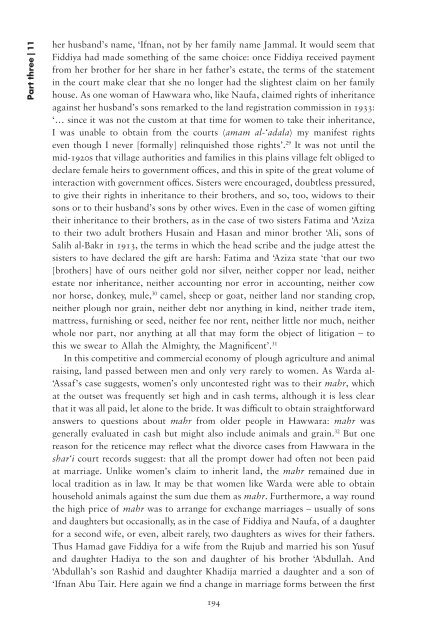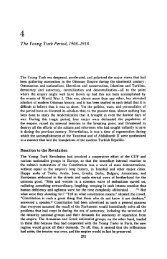Governing property, making the modern state - PSI424
Governing property, making the modern state - PSI424
Governing property, making the modern state - PSI424
You also want an ePaper? Increase the reach of your titles
YUMPU automatically turns print PDFs into web optimized ePapers that Google loves.
Part three | 11<br />
her husband’s name, ‘Ifnan, not by her family name Jammal. It would seem that<br />
Fiddiya had made something of <strong>the</strong> same choice: once Fiddiya received payment<br />
from her bro<strong>the</strong>r for her share in her fa<strong>the</strong>r’s e<strong>state</strong>, <strong>the</strong> terms of <strong>the</strong> <strong>state</strong>ment<br />
in <strong>the</strong> court make clear that she no longer had <strong>the</strong> slightest claim on her family<br />
house. As one woman of Hawwara who, like Naufa, claimed rights of inheritance<br />
against her husband’s sons remarked to <strong>the</strong> land registration commission in 1933:<br />
‘… since it was not <strong>the</strong> custom at that time for women to take <strong>the</strong>ir inheritance,<br />
I was unable to obtain from <strong>the</strong> courts (amam al-‘adala) my manifest rights<br />
even though I never [formally] relinquished those rights’. 29 It was not until <strong>the</strong><br />
mid-1920s that village authorities and families in this plains village felt obliged to<br />
declare female heirs to government offices, and this in spite of <strong>the</strong> great volume of<br />
interaction with government offices. Sisters were encouraged, doubtless pressured,<br />
to give <strong>the</strong>ir rights in inheritance to <strong>the</strong>ir bro<strong>the</strong>rs, and so, too, widows to <strong>the</strong>ir<br />
sons or to <strong>the</strong>ir husband’s sons by o<strong>the</strong>r wives. Even in <strong>the</strong> case of women gifting<br />
<strong>the</strong>ir inheritance to <strong>the</strong>ir bro<strong>the</strong>rs, as in <strong>the</strong> case of two sisters Fatima and ‘Aziza<br />
to <strong>the</strong>ir two adult bro<strong>the</strong>rs Husain and Hasan and minor bro<strong>the</strong>r ‘Ali, sons of<br />
Salih al-Bakr in 1913, <strong>the</strong> terms in which <strong>the</strong> head scribe and <strong>the</strong> judge attest <strong>the</strong><br />
sisters to have declared <strong>the</strong> gift are harsh: Fatima and ‘Aziza <strong>state</strong> ‘that our two<br />
[bro<strong>the</strong>rs] have of ours nei<strong>the</strong>r gold nor silver, nei<strong>the</strong>r copper nor lead, nei<strong>the</strong>r<br />
e<strong>state</strong> nor inheritance, nei<strong>the</strong>r accounting nor error in accounting, nei<strong>the</strong>r cow<br />
nor horse, donkey, mule, 30 camel, sheep or goat, nei<strong>the</strong>r land nor standing crop,<br />
nei<strong>the</strong>r plough nor grain, nei<strong>the</strong>r debt nor anything in kind, nei<strong>the</strong>r trade item,<br />
mattress, furnishing or seed, nei<strong>the</strong>r fee nor rent, nei<strong>the</strong>r little nor much, nei<strong>the</strong>r<br />
whole nor part, nor anything at all that may form <strong>the</strong> object of litigation – to<br />
this we swear to Allah <strong>the</strong> Almighty, <strong>the</strong> Magnificent’. 31<br />
In this competitive and commercial economy of plough agriculture and animal<br />
raising, land passed between men and only very rarely to women. As Warda al-<br />
‘Assaf’s case suggests, women’s only uncontested right was to <strong>the</strong>ir mahr, which<br />
at <strong>the</strong> outset was frequently set high and in cash terms, although it is less clear<br />
that it was all paid, let alone to <strong>the</strong> bride. It was difficult to obtain straightforward<br />
answers to questions about mahr from older people in Hawwara: mahr was<br />
generally evaluated in cash but might also include animals and grain. 32 But one<br />
reason for <strong>the</strong> reticence may reflect what <strong>the</strong> divorce cases from Hawwara in <strong>the</strong><br />
shar‘i court records suggest: that all <strong>the</strong> prompt dower had often not been paid<br />
at marriage. Unlike women’s claim to inherit land, <strong>the</strong> mahr remained due in<br />
local tradition as in law. It may be that women like Warda were able to obtain<br />
household animals against <strong>the</strong> sum due <strong>the</strong>m as mahr. Fur<strong>the</strong>rmore, a way round<br />
<strong>the</strong> high price of mahr was to arrange for exchange marriages – usually of sons<br />
and daughters but occasionally, as in <strong>the</strong> case of Fiddiya and Naufa, of a daughter<br />
for a second wife, or even, albeit rarely, two daughters as wives for <strong>the</strong>ir fa<strong>the</strong>rs.<br />
Thus Hamad gave Fiddiya for a wife from <strong>the</strong> Rujub and married his son Yusuf<br />
and daughter Hadiya to <strong>the</strong> son and daughter of his bro<strong>the</strong>r ‘Abdullah. And<br />
‘Abdullah’s son Rashid and daughter Khadija married a daughter and a son of<br />
‘Ifnan Abu Tair. Here again we find a change in marriage forms between <strong>the</strong> first<br />
194












